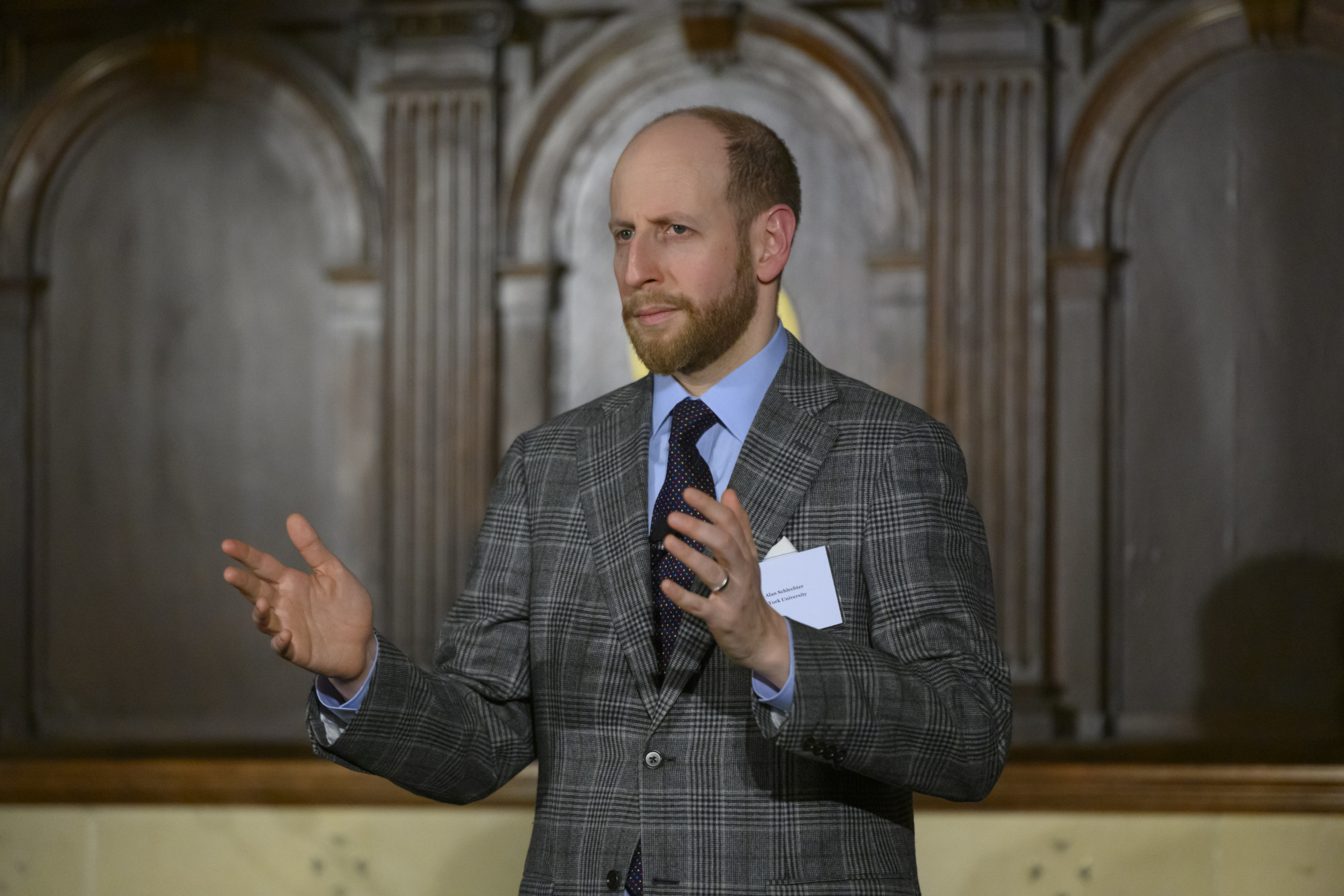Five minutes with Alan Schlechter and you can see why students at NYU line up to take his class. He is funny, irreverent and not afraid of showing his vulnerability.
Schlechter is a child psychiatrist at Bellevue Hospital in New York City and an associate professor at NYU’s Langone Medical Center. With his friend and collaborator, Dan Lerner, he teaches the “The Science of Happiness,” class — the most popular elective at the school.
Since 2012, Schlechter and Lerner have taught tens of thousands of NYU students that focusing on their wellbeing, including positive emotions, will not only make them happier, it will make them more successful, whatever their definition. Their curriculum became the foundation for the book they co-authored called U Thrive: How to Succeed in College (and Life.)
“Let’s face it, college is stressful and we’re never going to make it not stressful,” he said. “But we can make it easier for students by increasing their wellbeing.”
Schlechter started the course after a tragic year at NYU where several students died by suicide. In the aftermath, the school launched a number of mental health initiatives including a new area of study called the child and adolescent minor in mental health (CAMH), meant to increase people’s awareness of mental illness and mental wellbeing.
As part of CAMH, “Happiness” examines the state of college-student mental health and wellness on a personal and systems level. But what started as an antidote of sorts for poor mental health has become a forum for joy, meaning and self-expression. The key to the professors’ success in this area may well be their delivery.
“We are constantly trying to connect with students and that means submerging serious topics with material that will actually grip them,” Schlechter said.
“If we said, ‘let’s talk about anxiety, most of our students would be like ‘No thanks, that makes me uncomfortable.’ If we called the course ‘The Science of Depression,’ no one is taking the class.”
Sharing his story
Schechter says the Science of Happiness is the course he wished he had taken in college.
“I come from a long line of anxious people and my junior year in college my anxiety surfaced in a way that put a full halt on my ability to function,” he said.
Schlechter received therapy but terminated it as soon as he was feeling better. It wasn’t until he was 27 that he said he really took care of his mental health. Confronting issues early on is a strategy he purports in his lectures, as is understanding that wellness is a life-long journey, not an end it itself.
“I am now 43 years old and I’m still working on myself.”
In their class, Schechter and Lerner use a definition of wellbeing called PERMA – positive emotions, engagement, relationship, meaning and accomplishments to teach students how to better care for their wellbeing. Schechter says that about 30 – 35% of the class is about overcoming mental health challenges. This includes learning about cognitive behavioral therapy – one of the few evidence-based strategies that can reduce the course of depression and anxiety.
About 65 to 70% of the class is about raising students’ own level of wellbeing. For the high-performing students at NYU, this means teaching them that there are ways of doing better without studying more. Again, Schlechter draws from his own experience.
“I didn’t go out much in college,” he said. “Partly because of my social anxiety and partly because I thought I would have less stress if I was ahead with my work. So I’d go to the library and watch my closest friend go off to a party, literally through the glass, and think ‘Ha, I’m getting ahead.’ Not true.”
Schlechter said his best friend graduated with some of the highest honors in the school because he made positive relationships and emotions a priority.
“Meanwhile, I’d go home every night and be like ‘Why don’t I have a girlfriend?’”
Schlechter believes that, as a success-obsessed country, we have the equation all wrong. Happiness does not come from success but success can come from happiness, he said.
Like sociologist Corey Keyes and other experts he admires, Schlechter laments that mental illness is rarely viewed from a prevention perspective as physical health is. He believes that like lowering your blood pressure to protect against stroke, focusing on the positive and purposeful can vaccinate against worsening anxiety and depression.
“U Thrive” is Schlechter and Lerner’s effort to scale what they teach and what they’ve learned to more students throughout the country. Used at many colleges as part of orientation, the book provides practical advice on everything from finding meaning in careers to nutrition, mindfulness, and sleep. Their criteria: If the material is not engaging to undergraduates, they don’t include it.
Schlechter said, “I used to talk about cholesterol in the class and Dan was like, ‘What are you doing? They don’t care about cholesterol.’ We don’t talk about cholesterol anymore. Even though my cholesterol is really important to me, I’m not bringing it up.”



